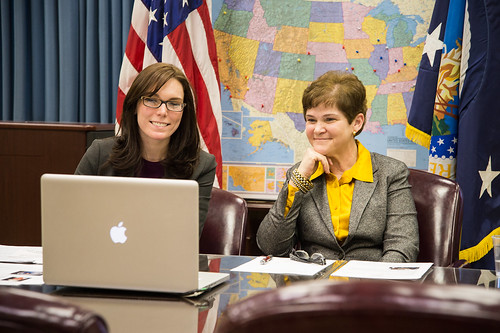Coming from a farming family in Georgia, I know firsthand the risks farmers take each and every day. The work is hard, the margins are slim and Mother Nature can be fickle. The questions that my family is asking about what happens to our farm in the future are questions that are shared by farmers across the country. Where will the next generation of farmers come from? Who will they be? Where will they live? How will they get started? What do they need to succeed?
Yesterday, I hosted a Google+ Hangout with Kate Danner and Alejandro Tecum, two passionate individuals who share a love of agriculture. They spoke about the challenges and experiences of new farmers across the country. With the recent Agricultural Census indicating the average age of farmers continues to rise and opportunities for new farmers are growing, I wanted to know why Kate and Alejandro got into agriculture and what advice they could offer to others interested in doing the same.
Kate is a corn and soybean farmer in Aledo, Illinois. She has been farming 1,500 acres with her father since she was a little girl. Kate told us that she left the farm for a University volleyball scholarship and returned to the farm with a passion to know more and keep the family business going. Now when she is not hard at work on the land, she is a hard at work learning more about how to be a better farmer.
Alejandro, originally from Guatemala, came to the United States 14 years ago. He now directs Adelante Agricultura, a non-profit in Forest Grove, Oregon that trains new and immigrant farmers on how to harness their passion for the land and their agricultural skills into productive small businesses.
Both Kate and Alejandro underscored some of the most important things a new farmer needs to know: that farming is hard work and the most successful farmers think of themselves as business people first and farmers second. We also talked about how at USDA, we are making it easier for new farmers to access the programs and resources we offer. Finally, I urged all new farmers to have a seat at the table as people across the country discuss the future of farming. It is key to share your experience with others so that the future of ag reflects all the diversity of experience that each new farmer brings to the table.
I was amazed at the range of questions that came in over Twitter using #newfarmers. While we couldn’t get to all of them during our conversation, keep an eye on twitter as we work our way through answering them.
This Hangout is the first in a series I will be hosting to discuss issues specific to new and beginning farmers and what we can do to build a strong agricultural future. I want you to be at the table. Please let me know what topics you would like me to cover. From succession planning to accessing capital to integrating new technologies on the farm, use #newfarmers to let us know what you want to talk about next.



